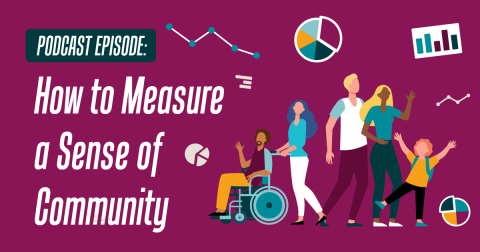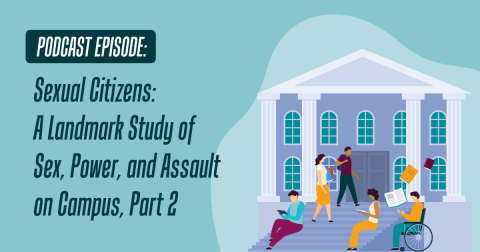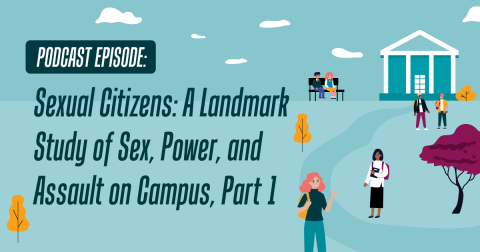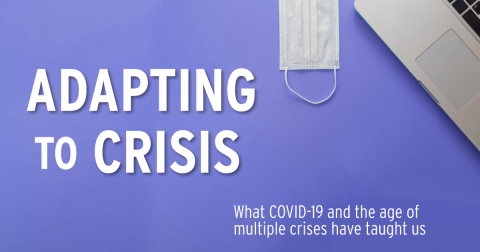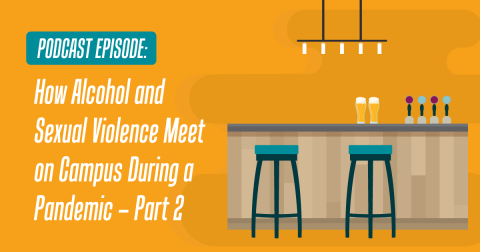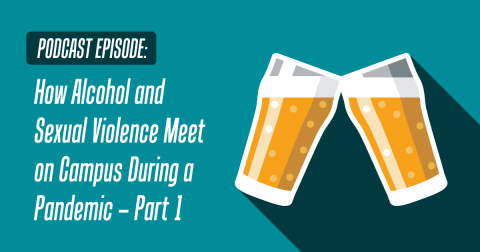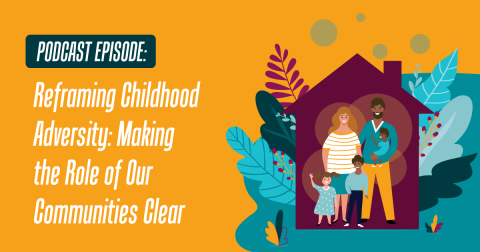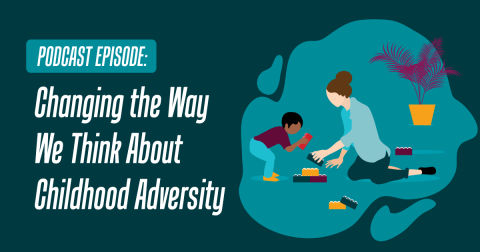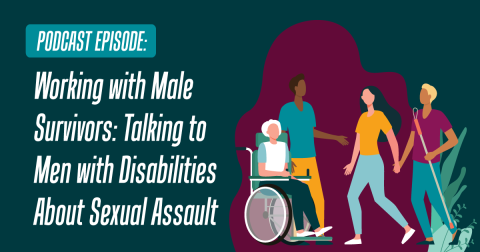Megan Thomas is the Communications Specialist at NSVRC. She manages the national newsletter The Resource, as well as editing, reviewing, and designing publications.
- August 12, 2021
- Megan Thomas
Feeling connected in your community is a protective factor against the risk of perpetrating sexual violence. Are you thinking about how to measure this in your prevention work? In this episode, NSVRC’s Evaluation Coordinator, Sally J. Laskey, talks with researchers Iris Cardenas, a PhD Candidate in the School of Social Work at Rutgers University, and Dr. Jordan Steiner about the Brief Sense of Community Scale and their study that examined the cultural relevance of one specific tool with non‐Hispanic, Black, and Hispanic college students. For assistance with accessing research on this topic,
- July 30, 2021
- Megan Thomas
In the second part of a two-part episode, we continue our conversation with Dr. Jennifer S. Hirsch and Dr. Shamus Khan, authors of the book Sexual Citizens: A Landmark Study on Sex, Power, and Assault on Campus. On this episode, we discuss how the book has been received, as well as the implications of the book and the Sexual Health Initiative to Foster Transformation (SHIFT) study for sexual violence prevention work. Participants: Jennifer S. Hirsch, Ph.D, Mailman School of Public Health at Columbia University Shamus Khan, Ph.D., Princeton University Chad Sniffen, M.P.H., National Sexual
- July 30, 2021
- Megan Thomas
Content warning: This episode contains a detailed account of a sexual assault. In the first part of a two-part episode, we speak with Dr. Jennifer S. Hirsch and Dr. Shamus Khan, authors of the book Sexual Citizens: A Landmark Study on Sex, Power, and Assault on Campus. Sexual Citizens was named one of National Public Radio’s Best Books of 2020. In this episode, we discuss the principles of the book and its key concepts: sexual projects, sexual citizenship, and sexual geographies. Participants: Jennifer S. Hirsch, Ph.D, Mailman School of Public Health at Columbia University Shamus Khan, Ph.D
- July 22, 2021
- Megan Thomas
In the Spring 2021 edition of The Resource, we're exploring how the movement to end sexual violence has adapted over the past year and a half due to COVID-19. We take a look at the shifted made to the national Sexual Assault Awareness Month campaign, as well as how the National Sexual Assault Conference changed to a virtual model. This issue also includes: Responses from local advocates on how they adapted their direct services A spotlight on an online resource for parents and caregivers A look back at 20 years of advocacy and prevention Recommended reading lists on digital services and
- July 19, 2021
- Megan Thomas
In this episode, we continue our conversation with Dr. Elizabeth Anderson, Dr. Elise Lopez, and Dr. Mary Koss. Listen as we talk about the impact of sexual violence on women and how the COVID-19 pandemic has changed the dynamic of sexual violence on campus. Participants: Elizabeth Anderson, Ph.D, International Center for Research on Women Elise Lopez, Ph.D., University of Arizona Consortium on Gender Based Violence Mary Koss, Ph.D., University of Arizona Mel & Enid Zuckerman College of Public Health Chad Sniffen, Research and Evaluation Director at RALIANCE
- July 19, 2021
- Megan Thomas
In this episode, we speak with Dr. Elizabeth Anderson, a research scientist at the International Center for Research on Women with the Global Health, Youth, and Development team; Dr. Elise Lopez, the Director of the University of Arizona consortium on gender-based violence; and Dr. Mary Koss, a Regent's Professor at the Mel and Enid Zuckerman College of Public Health at the University of Arizona. Dr. Koss conducted the first national study of sexual assault among college students in the United States, which was the basis of the book I Never Called It Rape that was re-released in 2019. Join
- June 23, 2021
- Megan Thomas
Created in partnership with the Urban Institute, NSVRC, RALIANCE, and the Purple Campaign, this report highlights how employers have adapted to the new world of work following the onset of the COVID-19 pandemic. The report shares key statistics, emerging trends, policies, and practices that have been implemented by industry leaders to address harassment in the workplace.
- June 17, 2021
- Megan Thomas
On this episode, NSVRC’s Laura Palumbo and Sally J. Laskey continue their discussion with Dr. Julie Sweetland, Senior Advisor at the FrameWorks Institute, about her 2021 report, Reframing Childhood Adversity: Promoting Upstream Approaches. They share guidance on how to talk about community- and policy-level strategies for prevention. Participants: Laura Palumbo, NSVRC Communications Director, Sally J. Laskey, NSVRC Evaluation Coordinator Dr. Julie Sweetland, FrameWorks Institute Listen to Part 1: Changing the Way We Think About Childhood Adversity
- June 17, 2021
- Megan Thomas
How we think about adversity experienced in childhood matters. On this episode, NSVRC’s Laura Palumbo and Sally J. Laskey talk with Dr. Julie Sweetland, Senior Advisor at the FrameWorks Institute, about her 2021 report, Reframing Childhood Adversity: Promoting Upstream Approaches, and how it connects with our research on messages about preventing sexual harassment, abuse, and assault. Participants: Laura Palumbo, NSVRC Communications Director Sally J. Laskey, NSVRC Evaluation Coordinator Dr. Julie Sweetland, FrameWorks Institute
- June 14, 2021
- Megan Thomas
Leigh Ann Davis and James Meadours join us for a conversation on working with male survivors of sexual assault who have disabilities. They talk about tools they’ve worked on like the Talk about Sexual Violence Project, which educates health care providers on how to talk to men with disabilities about sexual assault; what advocates can do to increase access to services; and more. Leigh Ann is director of criminal justice initiatives at The Arc of the United States, overseeing The Arc's National Center on Criminal Justice and Disability. James is a board member on Texas Advocates and a
Pagination
- Page 1
- Next page

